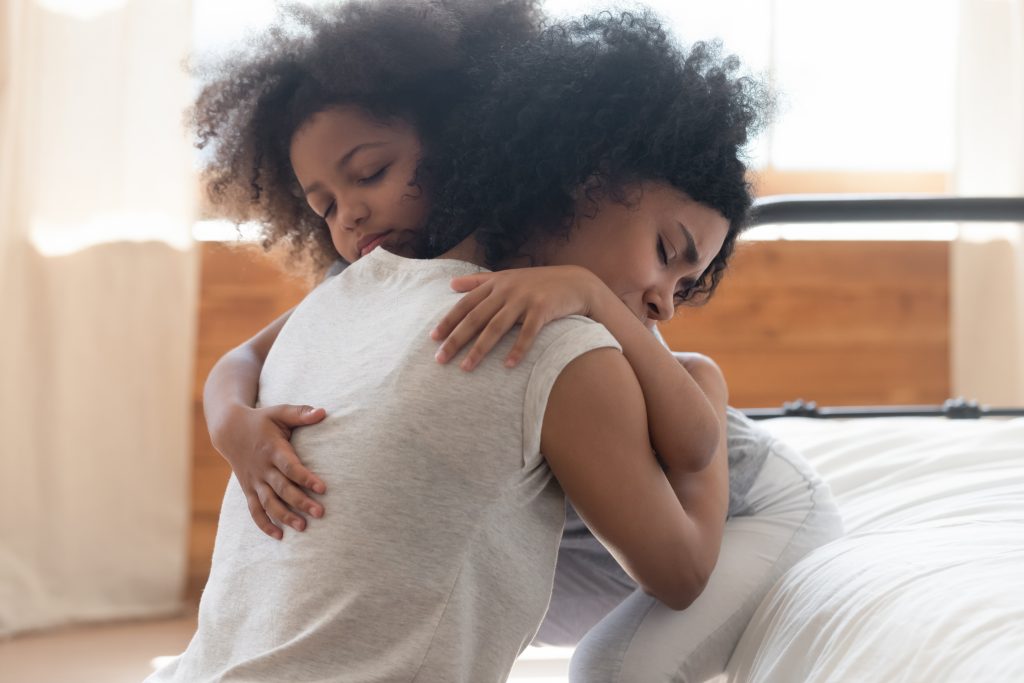From the pandemic to protests, and politics, are children being emotionally impacted by all the stressors of 2020?
We’re seeing an increase in anxiety and depression in older children and a fair amount of fear and concern in younger children. I would go so far to say that infants (nine months and younger) are also being impacted indirectly by the stresses of the past year. Children of all ages have been impacted directly whether it’s not going to school, not being able to be with friends, or not seeing family. And they’ve also been impacted indirectly — which is equally profound — whether it’s parental loss of work, financial pressures, or even parents working at home and everyone being in close proximity.
How does parental stress affect children?
Children are going to look to you for your reaction to what’s going on, and they can sense your stress. Even infants can sense parental stress. There’s the old adage on the plane that parents need to put on their own oxygen mask before putting on their children’s, and that’s the case when it comes to stress. In your interest in supporting your child, don’t neglect yourself. Parents need to practice self-care first in order to be able to help their children deal with their own stress. So giving yourself and your children grace is essential to seeing your way through all of this.
Should parents try to keep kids away from the news?
It really depends on your child’s age, developmental stage, and interests. If you have a teenager, they have ready access to the news on their own. It’s hard for you to keep them away from it. In that situation, you should check in with them and have conversations about what they’re thinking, what they’re learning, what they’re worried about, etc. I generally don’t advise parents to let their young children see the news because the things they may see could make them feel like the world is a very, very scary place. However, I think it’s still important to talk to them about what’s happening in a way they can understand. Some children use information as a way of comforting themselves. It can be anxiety relieving. In those cases, it’s kind of a glass half full, glass half empty situation.
Learn more about a variety of kid-friendly news outlets here (link).
What are some signs children are feeling anxious or stressed?
There are a lot of warning signs to look for: sleep disturbances, irritability, lack of appetite. Infants also show similar signs of stress. If you do have concerns about your child’s anxiety or if they are exhibiting debilitating symptoms from it, you should absolutely seek professional help. Talk to your child’s pediatrician. Get a referral to see a counselor or child psychologist to get them the support they need. Don’t let these things continue to fester because the thing about anxiety is it builds on itself, and your child may need skills to help them cope with it.
What can parents do if they suspect their child is experiencing anxiety?
Recognize their symptoms and validate their feelings. Those are two key things that you can do as a parent to help your child with anxiety. It’s really important that you have conversations with them about what’s going on, and that you do it on a regular basis. What they’re feeling today is likely different than what they were feeling six months ago, both because they’re older and because they’ve learned new things. But the challenge is you don’t want to check in so much that you induce additional anxiety. For infants experiencing signs of anxiety, nothing is more reassuring for them than being held and loved.
What tools that parents can use to help their kids manage anxiety?
Emotion coaching is a great tool to start with. The goal is to teach children to understand their emotions by labeling them. This helps children contextualize how they’re feeling during times of stress, and it also helps parents talk to them about it. Having frequent conversations with your kids encourages an understanding that feelings are a part of living and that they come and go. It’s really important to not minimize your child’s feelings and that you instead use emotion coaching to name, acknowledge, and reassure them.
Learn more about emotion coaching and the steps to take with your child here (link).
Additional Parenting Resources for Anxiety
- American Academy of Pediatrics: Interim Guidance on Supporting the Emotional and Behavioral Health Needs of Children, Adolescents, and Families During the COVID-19 Pandemic
- Seattle Children’s Hospital: Positive Parenting in a Stressful World
- Child Mind Institute: Anxiety Basics Parenting Guide
- Greater Good Science Center: Seven Ways to Cope with Uncertainty
- Stanford University: Resources for Parents of Children with Anxiety Disorders
